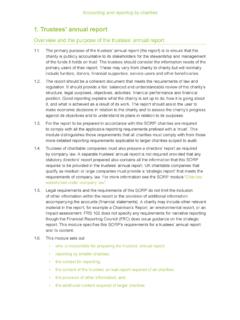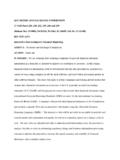Transcription of Receipts and payments accounts for smaller charities
1 Receipts and payments accounts for smaller charities How to prepare Receipts and payments accounts CCNI ARR03 1 July 2016. The Charity Commission for Northern Ireland The Charity Commission for Northern Ireland is the regulator of charities in Northern Ireland, a non-departmental public body sponsored by the Department for Communities. Our vision To deliver in partnership with other key stakeholders in the charitable sector a dynamic and well governed charities sector in which the public has confidence, underpinned by the Commission's effective delivery of its regulatory role.. Further information about our aims and activities is available on our website Equality The Charity Commission for Northern Ireland is committed to equality and diversity in all that we do.
2 Accessibility The Commission's website has been designed to W3C standards of accessibility and includes a number of features to enhance accessibility for a wide range of individuals. These include colour contrast and resize options. Materials may be made available in alternative formats on request. If you have any accessibility requirements please contact us. Online or in print If you are viewing this document online, you will be able to navigate your way around by clicking on links either within the contents page or text. We have produced a glossary that provides further information, definitions and descriptions of some key terms. The words in bold green type indicate words that are found in the glossary towards the end of this document. If you are reading the document online you can click on the word and it will link you to the definition in the glossary.
3 The words in pink italics indicate other guidance or databases. Please check our website to make sure you're using the latest versions of forms and guidance. CCNI ARR03 2 July 2016. Contents Section 1: Overview 4. Section 2: About this guidance 5. Section 3: Introduction to Receipts and payments 10. accounts What are the legal requirements for Receipts and payments accounts ? Can my charity prepare Receipts and payment accounts ? Section 4: What must be in the Receipts and payments 14. accounts ? The Receipts and payments account records and summarises cash movements only The statement of assets and liabilities Help preparing Receipts and payments accounts Appendix 1: Glossary 23. Useful contacts 28. Useful links and guidance 30. If you are dissatisfied with our service 31.
4 Freedom of information and data protection 32. Contact details 33. CCNI ARR03 3 July 2016. Section 1: Overview All charities must be aware of their legal requirements when preparing a charity's financial statements, the trustees' annual report and having these documents reviewed or audited. The Charity Commission for Northern Ireland (the Commission) has developed a suite of guidance to help charities understand their legal requirements. For help understanding which guidance documents apply to your charity you should read ARR01 Charity reporting and accounting: guidance summary. All charity trustees should begin by reading ARR02. Charity reporting and accounting: the essentials. It is important that charity trustees read this guidance first as it provides information on the new accounting and reporting framework in place for registered charities from 1 January 2016, and an overview of The charities ( accounts and Reports) Regulations (Northern Ireland) 2015.
5 It also includes an important section on the requirement for all charities to have their accounts independently examined or audited. The full list of accounting and reporting guidance includes: ARR01. Charity reporting and accounting: guidance summary ARR02. Charity reporting and accounting: the essentials ARR03. Receipts and payments accounts ARR04. Accruals accounts ARR05. How to complete the annual monitoring return ARR06. Charity reporting: Interim arrangements and the annual monitoring return ARR07. Independent examination of charity accounts : examiner's guide ARR08 The trustees' annual report and public benefit reporting This document ARR03 Receipts and payments accounts is aimed at smaller charities . You should read this guidance if you are a small charity that is not a company and you qualify to prepare Receipts and payments accounts .
6 Generally, this applies to charities with gross income of 250,000 or less. It provides detailed guidance on the new legal requirements and suggested formats for Receipts and payments accounts . This guidance should be read alongside ARR08 The trustees' annual report and public benefit reporting CCNI ARR03 4 July 2016. Section 2: About this guidance Who does this guidance apply to? This guidance is aimed at charity trustees, who may also be referred to by other terms, such as trustees, members of management committees, or directors of charitable companies, as well as anyone acting on behalf of a charity, for example a helper group, solicitor, accountant, agent or adviser. The guidance applies to all types of charity, for example, charitable companies and charities that are not companies, such as unincorporated associations, industrial and provident societies and trusts.
7 What does this guidance cover? This guidance covers the statutory requirements and suggested formats for registered charities in relation to producing a set of Receipts and payments accounts . The requirements within this guidance apply broadly to charities that are not companies that are registered with the Commission and have an annual income of 250,000 or less. Please note that these requirements will apply for your first full financial period beginning on or after 1 January 2016, or your date of registration with the Commission, if later. If you are in any doubt, the guidance below will assist you in identifying which requirements apply to you. If you are a registered charity you must ensure your charity accounts and reports comply with the new accounting and reporting regulations.
8 These apply to your first full financial year beginning on or after: 1 January 2016 or The date of registration with the Commission if later than 1 January 2016. What does this guidance not cover? This guidance does not provide a full overview of the accounting and reporting framework based on The charities ( accounts and Reports). Regulations (Northern Ireland) 2015, including the requirement for charities to prepare a trustees' annual report and have their accounts and reports reviewed or audited. It also does not cover the accounting and reporting CCNI ARR03 5 July 2016. requirements for charities that must prepare accruals accounts . This information is covered in other guidance documents, available on the Commission's website, which make up the suite of accounting and reporting guidance.
9 Accounting and reporting requirements for investment funds, organisations classified as Section 167 charities , and charities that have been linked by the Commission, for example special trusts, are not covered in this guidance. The reporting framework that applies to these types of charities will be set out at a later stage. What will be published? All charity accounts and reports will be published on the charity's entry on the online register of charities . The register will also display the compliance status of registered charities in relation to annual reporting. When a charity submits their annual reporting information within 10 months from the end of the reporting period, their entry on the register will display as Up-to-date'. However if a charity does not file their annual reporting information on time this will be displayed on the register as in default'.
10 The register of charities will also display some information provided through the annual monitoring return. Further information on what will be published is included in the Commission's ARR05 How to complete the Annual monitoring return guidance. For information on the Commission's approach to publishing decisions refer to the Publishing our decisions policy. What are legal requirements and best practice? In this guidance, where we use the word must' we are referring to a specific legal or regulatory requirement. We use the word should' for what we regard as good practice, but where there is no specific legal requirement. Charity trustees should follow the good practice guidance unless there is good reason not to do so. For example, registered charities must apply the full accounting and reporting regulations to their accounts and reports prepared for the first full financial year beginning on or after 1 January 2016, or their date of registration with the Commission, if later.








